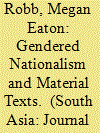| Srl | Item |
| 1 |
ID:
184801


|
|
|
|
|
| Summary/Abstract |
While there exists a substantial body of work on the reformist writings and women’s periodicals of the late colonial period, this article contributes to a newer conversation extending analysis of print periodicals into the post-colonial period through a discursive and material analysis of Akhbār-e Khavātīn (Women’s Newspaper), a Karachi magazine from 1966 edited by a journalist named Mussarat Jabin. Paying attention to how a woman’s magazine was produced, collected and archived makes visible the previously invisible choices of print technicians, editors and collectors. Even though the conditions of many of these choices remain obscured, this article argues that attention to the material conditions of printing and archiving offer new avenues for reflection. Akhbār-e Khavātīn normalised women’s journalism, and also gestured towards the presence of male editors and owners, technicians who collaborated with the editors to create print periodicals, and towards the American archivists who sought to preserve the magazines for nationalist aims.
|
|
|
|
|
|
|
|
|
|
|
|
|
|
|
|
| 2 |
ID:
146835


|
|
|
|
|
| Summary/Abstract |
Literary journals and newspapers aiming to reform the religious beliefs and domestic habits of women were common in early twentieth-century North India. Although most readings have focused on how these texts reflected male legislation of women's behaviour, we should look at Muslim reformist literature to understand male experiences; this investigation offers new insights into an emergent middle-class identity defined more by manners than birth. Readings of a previously little-researched Urdu newspaper, Madinah, and its women's section offer new insights on male experiences of reformism, characterized by profound ambivalence. Playfulness emerged in some reformist descriptions of women's voices, channelling the influence of rekhti. Ultimately Madinah cultivated pride in Islam's strict division of gender roles and conversely threatened men with shame for failing to regulate uneducated women. Descriptions of powerful, Ottoman women warriors were framed to incite men to acts of bravery, using reports from Europe as cautionary examples of the over-indulgence of women. While the newspaper offered outlets for men to express curiosity about women's experiences, ultimately reformist literature limited expressions of pleasure. Male ambivalence regarding the implications of the reformist project remained embedded in writing about women.
|
|
|
|
|
|
|
|
|
|
|
|
|
|
|
|